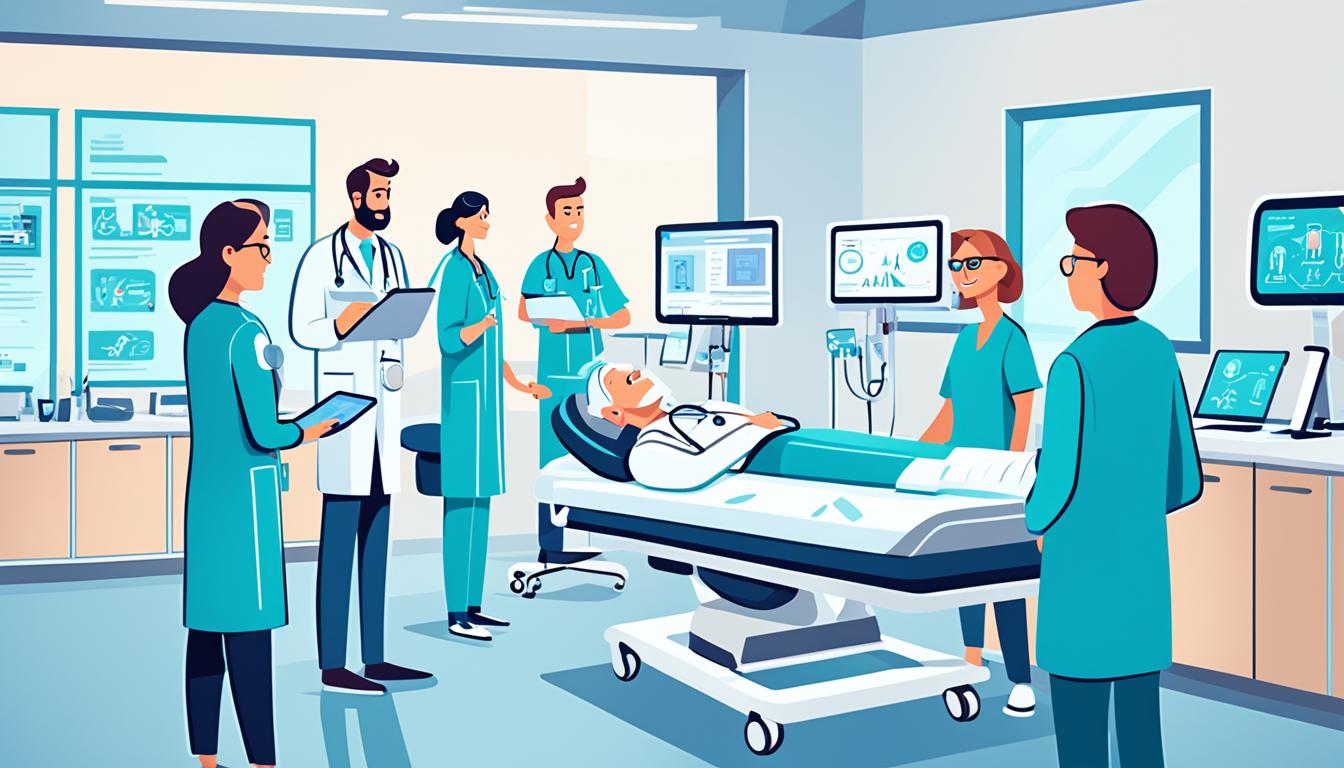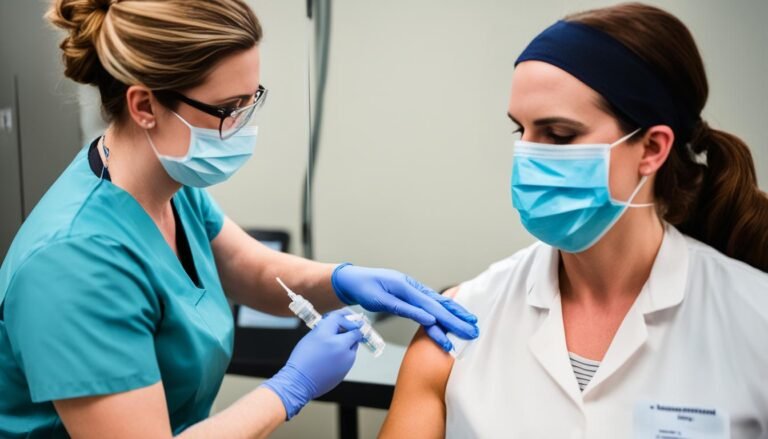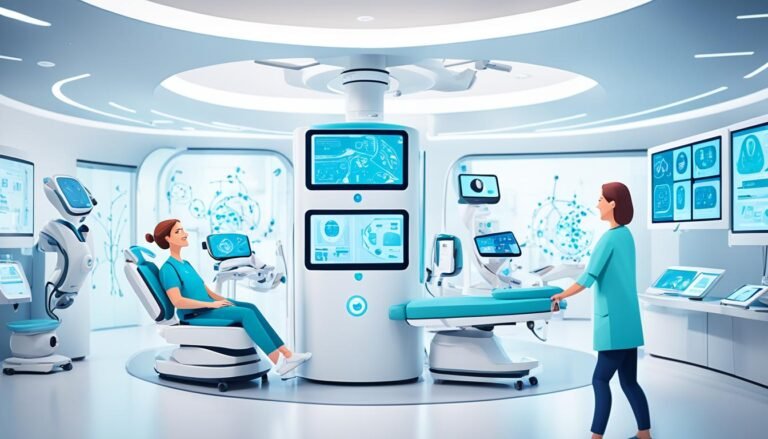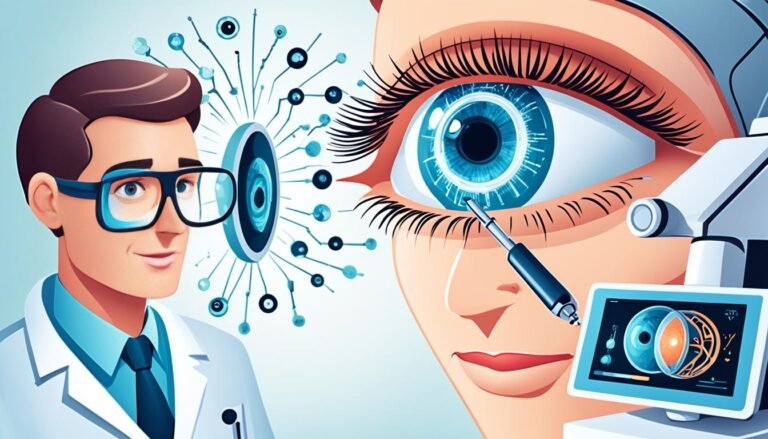AI in Healthcare: Revolutionizing Patient Care
Did you know artificial intelligence can check medical data way faster than any person? And it’s almost as accurate too. This shows how AI is changing the way we look after patients. Around the world, healthcare is getting better fast, thanks to AI. It can handle tough calculations and learn from data. AI helps doctors tailor treatments for each patient and even guess how they might do. This makes healthcare work better and could really change how we get medical help.
Key Takeaways
- AI in healthcare makes looking at medical data quicker, leading to speedy, precise diagnosis.
- Thanks to AI, healthcare is getting more personal, enriching how patients get care.
- AI is a big deal in making treatment plans that really fit each person’s health needs.
- With smart algorithms and learning machines, we’re making healthcare better, gaining trust from patients.
- But, we’ve got to keep an eye on problems like data privacy, biases, and ethics in AI tech.
The Intricacies of AI in Modern Healthcare
Artificial Intelligence (AI) is changing medical practice with new innovation. It can handle big data and offer insights, making it a key player in AI-driven patient care. Companies like Ozmosi are leveraging AI to merge clinical expertise with tech precision, advancing machine learning in healthcare.
Defining Artificial Intelligence in Medicine
Artificial Intelligence in medicine creates smart algorithms to think like humans in understanding medical data. Its main goal is to find out how prevention or treatment can affect patient outcomes. AI is good at learning to diagnose, recommend treatments, and make predictions from medical texts.
Additionally, utilizing an AI solution that eliminates a/r days can streamline billing processes, allowing medical professionals to focus more on patient care. By speeding up administrative tasks, these AI systems enhance efficiency, helping healthcare providers better meet patient needs.
The Evolution and Historical Milestones of AI in Healthcare
The story of AI in medicine is full of key moments that show its transformative power. Here’s a brief look at its history:
| Year | Development | Impact on Healthcare |
|---|---|---|
| 1951 | First AI Program | Set the stage for AI in healthcare. |
| 1956 | Dartmouth Conference | Made AI a serious field of study, helping healthcare tech. |
| 1997 | IBM’s Deep Blue | Demonstrated AI’s problem-solving skills. |
| 2010s | Advanced Virtual Assistants (e.g., Siri, Alexa) | Brought AI into everyday user interactions, shaping patient tools. |
AI has evolved from basic systems to smart self-learners in machine learning in healthcare. This shift is making care more personal and effective. Clearly, AI’s future in healthcare is bright.
Looking closely at these changes shows how AI applications in healthcare are more than just extras. They are changing how diseases are treated and how patient care is managed. AI represents the current and next wave of healthcare innovation.
AI’s Breakthrough in Disease Diagnosis and Treatment
The world of healthcare AI solutions has changed a lot with AI helping in diagnosis. AI uses machine learning and neural networks to improve AI-driven patient care. It is now more accurate and efficient. Traditional methods can make mistakes, but AI helps reduce those errors. In cancer care, AI is really good at reading medical images, which helps find the disease early.
AI in medical diagnosis is key not just in finding cancer but also in treating chronic conditions like diabetes. AI systems detect eye damage from diabetes early, called diabetic retinopathy. By looking at eye pictures, AI helps diagnose sooner and suggests ways to stop the disease from getting worse. AI in diagnosis is changing the game. It’s improving patient survival and life quality.
The table below looks at how AI and traditional methods compare in diagnosing different diseases:
| Condition | Traditional Diagnostic Accuracy | AI-Enhanced Diagnostic Accuracy | Impact on Patient Care |
|---|---|---|---|
| Breast Cancer | 88% | 92% | Reduced false positives and negatives |
| Skin Cancer | 86% | 95% | Highly accurate lesion classification |
| Diabetic Retinopathy | 74% | 90% | Earlier detection and intervention |
This AI-led shift is changing our view of AI-driven patient care. It is making healthcare more advanced and personal. The future might bring AI virtual check-ups and instant home diagnoses. As AI and data get better, AI in medical diagnosis will boost both doctors’ skills and give patients vital health info faster.
Enhancing Patient Engagement Through AI Innovations
Artificial Intelligence (AI) is changing how we engage with patient care. It brings personalized, proactive management to health. Healthcare AI solutions are key in patient care strategies now. They help provide a service that meets individual needs well.
AI-Driven Tools for Customized Patient Care Plans
AI-driven tools help make unique care plans. They use HIPAA compliant AI for healthcare to analyze patient data deeply and accurately. This way, healthcare providers can offer precise treatments.
Smart Devices and Wearables: Monitoring Patient Health in Real-Time
Smart devices and wearables change how we monitor health. Equipped with AI, they offer a more informed care approach. They track health metrics in real time, giving insights to patients and doctors.
In the sphere of AI applications in healthcare, see this table:
| Device | Health Metrics Monitored | AI-Driven Patient Engagement Benefits |
|---|---|---|
| Smartwatches | Heart rate, Activity levels, Sleep patterns | Real-time health tracking, personalized activity recommendations |
| Fitness Bands | Steps, Caloric burn, Distance | Daily health goals, motivational alerts |
| Health Monitoring Devices | Blood pressure, Blood glucose, Oxygen saturation | Remote monitoring for chronic conditions, trend analysis for preventive care |
These gadgets help patients actively engage in their health. They’re not just for collecting data. They encourage people to manage their well-being.
As AI-driven patient care grows, so does its potential to improve patient engagement. These AI solutions are intuitive. They ensure care is dynamic, adaptable, and focused on better health and personalized care.
Streamlining Administrative Functions with Healthcare AI Solutions
The healthcare technology landscape is changing fast, thanks to AI applications in healthcare. These AI tools are making clinic operations more efficient. By automating routine tasks, healthcare workers can spend more time caring for patients. Let’s dive into the ways AI is improving healthcare administration:
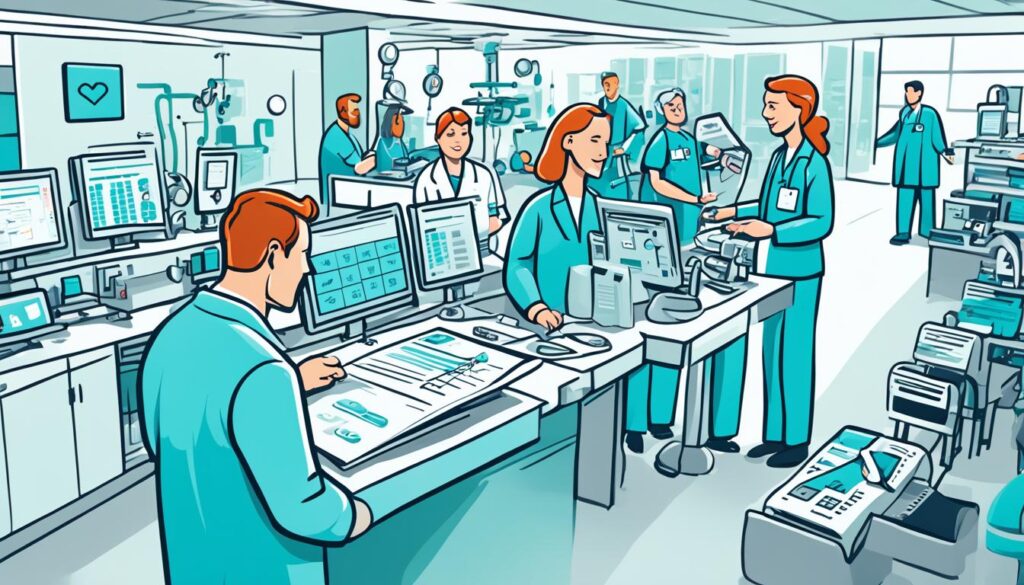
- Clinical Documentation: AI algorithms sort through lots of clinical notes quickly. This ensures patient records are always correct and up-to-date.
- Billing Procedures: AI makes medical billing more precise. This cuts down on errors and speeds up payments.
- Scheduling Systems: Advanced AI tools make booking appointments easy. They help clinics run smoothly and reduce waiting times.
Healthcare innovation is really taking off with AI. To show what’s changing, here’s how things used to be compared to how AI is making them better:
| Function | Traditional Approach | AI-Enhanced Method |
|---|---|---|
| Record Keeping | Manual data entry was error-prone. | AI automatically updates records accurately in real time. |
| Appointment Management | Scheduling by staff led to overlaps. | AI scheduling tools make better use of clinic hours. |
| Insurance Processing | Managing claims used to take a long time. | AI speeds this up by predicting claim outcomes. |
| Compliance Monitoring | Regulations required frequent checks, causing delays. | AI does continuous checks and reports instantly. |
“AI lets healthcare centers focus on what’s important – patient care. They become efficient and make fewer mistakes.”
By adding healthcare technology like AI, managing healthcare is getting much simpler. AI applications in healthcare not only make admin tasks more accurate. They also pave the way for more healthcare innovation in our data-filled world.
AI in Healthcare: The Revolution Transforming Patient Care
AI is changing medicine in big ways. It makes healthcare better by working with human skills. AI uses advanced algorithms to go through huge amounts of data.
This helps us understand, manage, and predict health issues better. The growth of machine learning in healthcare is huge. It leads to smarter, faster, and patient-focused medical care.
AI and Big Data: Pioneers of Predictive Healthcare Analytics
AI and big data are changing how we predict health trends. This tech lets us analyze big datasets easily. It finds trends and patterns that humans might miss.
This isn’t just cool – it’s changing healthcare. Experts can now better predict and meet patient needs. It’s making a big difference in stopping and managing diseases.
Machine Learning and Natural Language Processing: Enhancing Clinical Communications
Machine learning is doing more than just looking at data. It’s improving how doctors talk to patients. One key area is natural language processing.
This AI technology helps understand and use patient info better. It makes talking between doctors and patients smoother. The result? We save time, make fewer mistakes, and focus more on patients.
Navigating the Ethical Landscape of AI in Patient Care
Artificial Intelligence (AI) is changing healthcare, making it better and more innovative. But, this change also brings up important ethical questions. We need to carefully balance technology use and ethical values. This will help us positively change healthcare.
Privacy, confidentiality, and consent are key values when we talk about AI. Healthcare providers must protect these values. This builds trust with their patients.
Data Privacy and Security Concerns in the Age of AI
Ensuring patient data is private and secure is fundamental in using AI ethically. As technology evolves, protecting patient information is crucial. Healthcare organizations should implement strong data rules to deal with AI’s risks.
Overcoming Bias and Ensuring Equality in AI Algorithms
Bias in AI can affect patient care fairness. This bias might come from unbalanced data or mistakes in the AI’s design. It could mistakenly favor certain groups of patients. To fix this, we need careful checks and balanced data. This makes healthcare fair for everyone.
To better understand how to address these ethical issues, let’s compare different aspects:
| Aspect | Challenges | Strategies for Ethical AI |
|---|---|---|
| Data Privacy | Data breaches, unauthorized access | Advanced encryption, consistent policy updates |
| Data Security | Cyber-attacks, information theft | Continuous security training, AI security applications |
| Algorithmic Bias | Unintentional discrimination, skewed decision-making | Diverse datasets, bias detection algorithms |
| Equality in Care | Access disparities, varying outcomes | Inclusive design, rigorous testing across demographics |
By carefully handling these ethical issues, we can guide healthcare to a future where AI makes patient care better and fairer. This way, every patient gets the care and respect they deserve.
Advancements in Patient Education via Artificial Intelligence
The healthcare world is seeing a powerful combo of healthcare education and healthcare AI solutions. Patients are getting personalized education thanks to AI. This boosts their understanding of health and lets them manage their well-being better. We’re heading towards having well-informed patients who make smart health choices.
AI platforms excel at turning complex medical info into easy-to-grasp content. This content considers the patient’s health, history, lifestyle, and how they like to learn. So, education in healthcare is becoming more customized and effective.
- Data-Driven Insights: AI uses personal health data to make education fit each person.
- Intelligent Content Delivery: Gives educational content in formats that match different ways people like to learn.
- Continuous Learning: Adapts using patient feedback to make learning materials better and keep patients engaged.
Today’s healthcare AI solutions allow for a dynamic exchange. Patients do more than just receive info; they engage with it. This boosts their understanding and commitment to their health.
| Aspect of Patient Education | Benefits of AI Application |
|---|---|
| Personalization | AI tailors education to fit the health profile and preferences of each patient. |
| Accessibility | AI helps make educational materials easier to get, using different digital platforms. |
| Engagement | AI’s interactive tools help patients get more involved and improve their health habits. |
| Feedback Loop | Patient feedback helps continually refine and improve educational content. |
As AI in healthcare keeps evolving, patient education systems are getting better too. They’re becoming an integral part of the healthcare journey. This means health literacy is now key to achieving great patient outcomes.
The Role of AI in Driving Healthcare Technology and Innovation
Artificial Intelligence (AI) is changing healthcare fast. It’s making clinical practices and medical research better. With AI, healthcare pros can offer care that meets patients’ unique needs more closely. AI tools in medicine and research are bringing new ways to diagnose, treat, and develop drugs.
Improving Healthcare Delivery with AI-Enabled Devices
AI is upgrading medical devices, changing how healthcare is given. These AI tools help doctors make quick, data-backed choices. They work like care partners, improving how we diagnose and plan treatments. Thanks to AI, from high-tech scanners to smart wearables, patients are seeing better results.
AI in Research: Accelerating Drug Development and Discovery
AI is speeding up drug discovery in pharmaceutical research. It uses algorithms to analyze complex drug interactions. This cuts down the time needed to develop new drugs. It’s key for tackling new diseases and chronic conditions. AI in research is opening new paths in health innovation, proving its vital role in future medicine.
How AI Tools Support Healthcare Providers in Patient Care
Using AI in medical diagnosis changes the game. It brings precision and speed that humans alone can’t match. By using healthcare AI solutions, professionals get deep insights. This helps them make better patient assessments and treatment plans.
AI-driven patient care tools are a big help in decision-making. They analyze health info fast, in real-time. This lets healthcare providers create care plans that are up-to-date with medical data and findings.
When human smarts and artificial intelligence come together, care gets better. Decisions are backed up by strong analytics. Tools with easy-to-use dashboards make complex data simple. This helps providers quickly understand and act.
| AI Application | Benefits in Patient Care |
|---|---|
| Data-driven Diagnostics | Increased diagnostic accuracy with reduced error rates |
| Personalized Treatment Plans | Customized care tailored to the individual needs of patients |
| Clinical Decision Support | Enhanced decision-making through predictive analytics and risk assessment |
AI-driven patient care also frees up time for healthcare providers. AI takes care of routine tasks and analysis. This allows for more face-to-face time with patients. AI and healthcare providers working together push patient outcomes to new highs.
The power of AI in medical diagnosis and care is huge. But, technologists and healthcare pros must work together closely. This ensures AI tools meet real clinical needs well. As we keep improving healthcare AI solutions, healthcare becomes more efficient, effective, and centered on patients than ever.
Preventive Care and Population Health Management through AI
In our digital era, AI shines as a beacon for preventive care and better population health management. It gives healthcare systems the power to predict and manage health risks. This leads to a major change in healthcare: moving from reacting to diseases to preventing them early on.
AI Applications in Epidemic Outbreak Prediction and Management
Epidemic outbreak prediction and management benefits greatly from AI. By analyzing big, diverse datasets, AI helps spot outbreak patterns early. This ability is key for quick action, lessening the blow of infectious diseases. AI tools are also vital in planning how to use healthcare resources effectively.
Machine Learning in Chronic Disease Prevention Strategies
Machine learning in healthcare plays a big role in stopping chronic diseases before they start. It looks through vast amounts of health data to find hidden risk factors. Healthcare providers can then create personalized prevention plans for those at high risk. This shift means people can take charge of their health better than ever.
The use of AI in healthcare is leading to a future where technology and care work together better. As we improve these healthcare AI solutions, we’re making a society that’s more informed and healthier. This smart approach doesn’t just save lives; it also means less strain on healthcare systems worldwide. It shows how AI is crucial for a future with precise, preventive health management.
FAQ
What is AI in Healthcare?
AI in healthcare means using artificial intelligence to make patient care better. It involves machine learning, natural language processing, and AI tools. These help with diagnosis, treatment, paperwork, and connecting with patients.
How has artificial intelligence evolved in healthcare?
AI in healthcare started in the mid-20th century, growing significantly over time. Innovations in machine learning and natural language processing have been key. Now, AI can learn from data, improving diagnosis, treatment, and admin work.
How is AI improving disease diagnosis and treatment?
AI uses smart algorithms to make sense of medical data, spotting diseases early. This means diseases are identified quicker and more accurately. Tools like neural networks diagnose skin cancer and predict treatment responses, helping patients get better.
What role do AI-driven tools play in creating customized patient care plans?
AI tools are key in making care plans that match each person’s health needs. They analyze data from different sources, like wearables. Then, they suggest treatments, lifestyle tips, and ways to keep track of health.
How are smart devices and wearables utilizing AI for patient health monitoring?
AI is used in smart devices and wearables to keep an eye on health data. This helps find health problems early and tracks patient health trends. It’s great for preventing issues and managing health conditions.
How is AI streamlining administrative functions in healthcare?
AI automates regular tasks like scheduling, billing, and managing health records. This makes things easier for healthcare staff, cuts mistakes, and improves efficiency.
Why are AI and Big Data important in predictive healthcare analytics?
AI and Big Data are important because they process huge amounts of health data. This helps spot patterns and forecast outcomes. It aids in making clinical decisions, preparing for patient needs, and preventing health issues.
In what ways are machine learning and natural language processing enhancing clinical communications?
These technologies help with understanding and creating clinical notes. They draw useful information from patient talks and improve how healthcare workers talk to patients and each other.
What are the key ethical considerations of AI in patient care?
Keeping patient data safe and private is crucial. It’s also important to make AI fair and clear in how it helps make healthcare decisions. These steps keep healthcare ethical and trustworthy.
How does artificial intelligence contribute to patient education?
AI gives personalized and easy-to-understand health information to patients. It helps patients learn about their health, treatment options, and how to prevent problems, enabling wise health choices.
What impact does AI have on healthcare delivery and research?
AI greatly improves healthcare by providing advanced tools to doctors and speeding up care coordination. In research, it helps find new medicines and therapies much faster, advancing medical science.
How do AI tools support healthcare providers in patient care?
AI tools help with diagnosing, predicting patient outcomes, and planning treatment. They also reduce paperwork so doctors can focus more on caring for patients.
How are AI applications used in epidemic outbreak prediction and management?
AI predicts and maps out epidemics by analyzing lots of data. This helps health authorities plan how to prevent and handle epidemics, saving lives.
What role does machine learning play in chronic disease prevention strategies?
Machine learning looks at health data to spot early signs of chronic diseases. With this info, doctors can suggest ways to prevent diseases, helping patients stay healthy.

